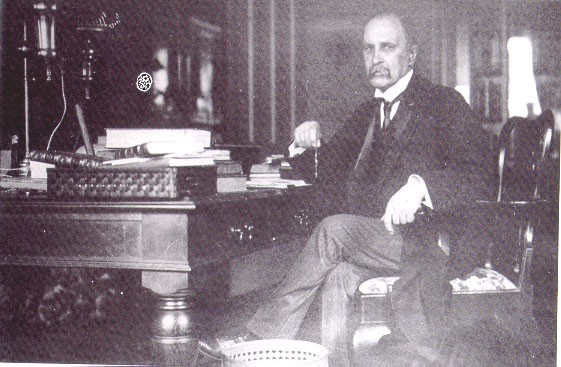The next time you visit the Hardin Library, peek into the John Martin Rare Book Room for a glimpse at the antique dark oak desk just inside the entrance. It once belonged to Sir William Osler (1849–1919), unquestionably the most famous English speaking physician of the late 19th and early 20th century. 
Sir William Osler at the desk that now resides in the John Martin Rare Book Room
Born in Canada and educated at Trinity College in Toronto and McGill University in Montreal, Osler held several prestigious positions before eventually moving to Johns Hopkins University in Baltimore where he formed the first organized clinical unit in the English-speaking world, and wrote his “Principles and Practice of Medicine,” probably the most widely read medical book in history. A prolific writer and speaker, Osler published hundreds of articles, scores of books, and gave countless speeches. His international reputation led to his appointment in 1905 as Regius Chair of Medicine at Oxford where he spent his remaining years.
It was at Oxford that Osler acquired the desk that now resides in the Hardin Library. Though he never had any formal Iowa connections, he did endorse the qualifications of his favorite pupil and close friend*, Campbell P. Howard (1877-1936) when University of Iowa president George MacLean was trying to attract more distinguished faculty to the medical school to bolster its standing shortly after the criticism it received in the 1908 Flexner Report. C.P. In fact, Howard’s subsequent appointment as head of internal medicine did indeed fortify the schools reputation. At his death in 1919, Osler left his Oxford desk to C.P. Howard who, in turn, left it to his son, Palmer Howard (1912-1990) who for a short time was also a College of Medicine faculty member. Palmer Howard then donated the desk to the Hardin Library in 1986.
* The Osler/Campbell link goes even further: Campbell P. Howard’s father, Robert Palmer Howard (1823–1889), was Osler’s professor at McGill.